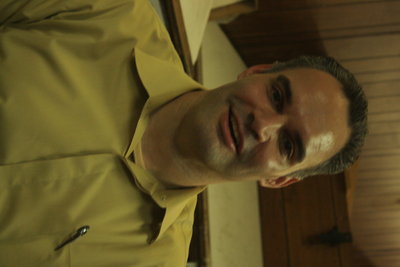When Marcus Valentiner came to America with his family in 2000, the future looked bright. He was able get a job on Wall Street and broker his way into a good life, with a home to raise his family.
Then disaster struck. The markets crashed and in 2008 he lost his job. Over the next year and a half, he saw his good life evaporate before his eyes.
“I had to sell my house and tap my savings, close my life insurance and 401K,” he said. “My parents eventually had to help me.”
Valentiner lost his job on Wall Street in the early months of what has since come to be called “The Great Recession.” He didn’t realize that he would remain unemployed for a year and a half, and that he would lose everything.
Born and raised in Germany, Valentiner has lived in Bayonne for about six years.
A stockbroker in 2008 when the bottom fell out of the economy, he began looking for work immediately, hoping the whole time he could get back to Wall Street.
During the recession, 8.4 million jobs were eliminated in the United States. Between Dec. 2007 and Jan. 2010, 20 million Americans collected unemployment.
But day by day, week by week, month after grueling month of searching, he could find no work. A year later, his unemployment expired, then went his savings and eventually his home.
In the middle of this, he began a workshop, something that would help him and others in the same situation looking to develop tools that might help them get back on the road they’d been tossed off of.
“Most job-searchers are not only overwhelmed by the challenges of looking for a job, but also by the psychological effect of being out of work,” he said.
“Everything in the book is how I experienced it.” – Marcus Valentiner
__________
Helping others by helping himself
The idea for the workshop and the book came out of an e-mail exchange with a friend in a similar situation, and he wondered how he might be able to turn this negative situation into something positive.
“I wanted to create something different,” he said. “This book merges a job search guide with a self help book. It is two books in one. Applying the right strategy and taking the right steps in the job-search process goes hand in hand with your mindset, how confident you are and how positive you approach the challenge of being unemployed but also life in general.”
But he didn’t want an abstract book, typical of many books of the genre, but instead something that was practical and reflected real life.
He also wanted to give an honest assessment of how brutal job searching can be, setting up basic criteria needed in any job search.
But it also talks about how managers will behave, and the logic behind how they recruit. Valentiner explains how to start the job search game by seriously analyzing yourself, getting the information you need and actively reaching out to employers, and even contacting managers directly. Furthermore it describes how to leave an impression during interviews and highlights the importance of following up and managing your expectations. At the same time, it shows that it is critical to understand that only the right mindset and the right approach will get you the job you are looking for.
“Everything in the book is how I experienced it,” he said. “Every quote is how I heard it. No exaggerations.”
He said he became a better worker because he applied the skills looking for work to the job when he actually got one.
He said it is important for the job searcher to know what to expect when seeking job, how he or she will get treated, and the book also proves steps for being active and reaching out.
“Unemployment has always been part of our economic system and job-search and recruiting became an industry that often leaves the unemployed individual in a passive and almost dependent role without providing effective advice,” he said.
In the job search section, many of the chapter titles speak for themselves such as “Knowing Yourself,” “Having a Vision, Having Goals, Having a Plan,” “Information is Key,” and “Working with Recruiters.” Other chapters focus on areas such as the interview and leaving an impression. But this section transitions into more philosophical ideas such as managing expectations and reactions and fear associated with long-time unemployment.
In the self-help portion, the chapters cover areas such as telling yourself there is always an opportunity, that you are the most important person in the world, that life is a game, and how to live in the moment, not giving up, pushing yourself, keeping your head clear, and not to put trust in others.
Eventually, his theories paid off for himself, since he returned to Wall Street and currently works as a stock-broker, trader and market analyst and has a career-coaching business.
For more information about the book or to schedule an interview, contact Valentiner at (908) 244- 9523 or visit www.volt-aic.com.
